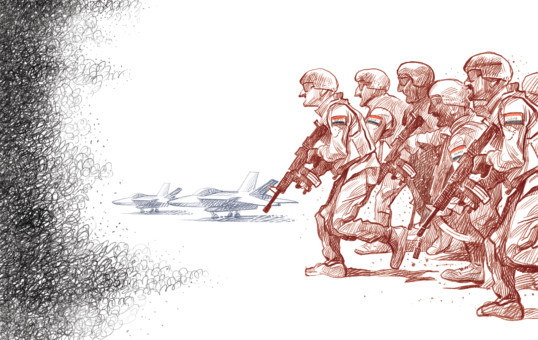
It is deeply shocking that the barbarians of Daesh (Islamic State of Iraq and the Levant) have controlled large parts of Syria and Iraq for more than nine months. They have been able to establish themselves as the effective authority over many millions of Iraqis and Syrians who are suffering dreadfully under their vicious dictatorship.
Even if the 61-nation coalition against Daesh does not yet have a clear strategy, it is clear that the war cannot be won from the skies. Only ground forces can hope to reconquer the territory, which must be done by fighting it out with Daesh forces town by town, street by street, house by house, until Daesh is no longer an effective force.
It is just over nine months since Daesh stormed into Mosul on June 10 — a city of more than one million people, which they have ‘governed’ ever since. But it was only on February 9 that General John Allen, who is the American coordinator for coalition, said that the Iraqi Army, backed by coalition air strikes, will launch a ground offensive “in the weeks ahead” to regain the territory lost to Daesh, including Mosul.
This slow response to Daesh’s invasion has been excoriated around the world. The British parliament’s cross-party Defence Committee chaired by Rory Stewart produced a scathing report last week, in which Daesh was described as the most dramatic and significant threat to regional stability and international security from the Middle East in decades, and the committee commented that it was “surprised and deeply concerned that the UK is not doing more”.
“The committee was shocked by the inability or unwillingness of any of the service chiefs to provide a clear and articulate statement of the UK’s objectives or strategic plan in Iraq. There was a lack of clarity over who owns a policy — and indeed whether such a policy exists.”
This kind of chaos is very disturbing, even given Prime Minister David Cameron’s determination to avoid offering any British leadership over Iraq. The UK parliamentary committee visited Iraq in December and was very surprised to find that only three UK military personnel were outside the Kurdish regions of Iraq, compared with 400 Australians, 280 Italians and 300 Spanish.
Retaking territory
This minimal amount of support for the regular Iraqi forces does not speak of any eagerness to prosecute the forthcoming crucial ground war with vigour, when the Iraqi forces start the essential work of retaking their territory from Daesh.
Another example of confusion (although this case was not from the formal coalition) was provided by Prince Turki Al Faisal, former head of Saudi Intelligence and head of the King Faisal Research Centre, who expressed his worry at the recent Annual Meeting in Davos that the Iraqi government has refused to share or take intelligence on Daesh (or any other topic) from the Saudis.
“Why can we not help?” he asked, making clear his frustration with the Iraqi government over his impression that the Iraqis were working under a close alliance with Iran, which was refusing to allow its regional Arab rival, Saudi Arabia, to play a significant role in Iraq.
Daesh is an existential threat to all Arab states and to the rest of the world. The deeply offensive organisation has murdered thousands of people, often in the most barbaric fashion. It has taught children to take guns and kill people. It has crucified some of its victims. It has burnt alive the Jordanian pilot Muath Al Kaseasbeh. And earlier this week, it beheaded 21 Copts it captured in Libya. It has forced entire populations into slavery and has massacred large numbers of others in attempted genocide.
Given all this, after a successful offensive this spring, the new Iraqi civil authorities will have the exceptionally difficult task of rebuilding civilian trust in an Iraqi regime that still has lingering Shiite sympathies, which trigger deep Sunni doubts despite Prime Minister Haider Al Abadi’s work in putting this right.
The incoming governors and administrators will struggle to win back the population’s loyalty, while at the same time, they will need to go through the population to establish who were the willing supporters of Daesh and who had been forced to collaborate for fear of torture and their families being massacred.
It would be very hard not to collaborate when faced with the prospect of being burnt alive in a cage if you refused or watching your wife and children being beheaded.
Yet, the returning refugees who lost everything to the Daesh assault will be burning for revenge and anxious to eliminate every vestige of collaborationists and there is a real danger that they will not bother too much about distinguishing between the unfortunate forced collaborators and the genuine Daesh supporters. As blood continues to flow all over Iraq, the damage that Daesh has done will be perpetuated for generations to come.
And all this applies only to Iraq, which is only one half of Daesh’s theatre of operations. Daesh is also firmly based in Syria, where the coalition members are nowhere near agreeing on how to find a political solution to the raging Syrian civil war, which all adds to the confusion.
See also A2 Page 5












